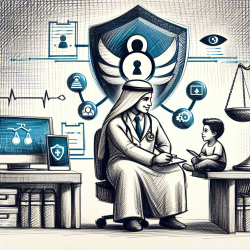Introduction
In today's rapidly evolving job market, the concept of micro-credentials has emerged as a significant player, particularly within the gig economy. This blog post delves into the insights from the research article "Gig qualifications for the gig economy: micro-credentials and the ‘hungry mile’" to explore how practitioners, especially those in speech language pathology, can leverage these credentials to enhance their skills and improve outcomes for children.
Understanding Micro-Credentials
Micro-credentials are short, competency-based, industry-aligned units of learning. They are designed to meet specific skill requirements and are often facilitated by digital platforms. In the gig economy, these credentials serve as a bridge between education and employment, providing individuals with the skills needed to thrive in a precarious labor market.
Implications for Practitioners
For practitioners in speech language pathology, micro-credentials offer a unique opportunity to stay ahead in the field. By acquiring targeted skills through these credentials, practitioners can enhance their expertise, ensuring they meet the evolving demands of their profession. This is particularly beneficial in online therapy settings, where technological proficiency and adaptability are crucial.
Benefits of Micro-Credentials
- Flexibility: Micro-credentials allow practitioners to learn at their own pace, accommodating busy schedules.
- Relevance: These credentials focus on current industry needs, ensuring practitioners are equipped with up-to-date skills.
- Cost-Effectiveness: Compared to traditional qualifications, micro-credentials are often more affordable, reducing the financial burden on individuals.
Challenges and Considerations
While micro-credentials offer numerous benefits, it's essential to approach them with a critical eye. The research highlights concerns about the potential for these credentials to contribute to the privatization of education and the fragmentation of qualifications. Practitioners should seek to balance the acquisition of micro-credentials with substantial qualifications that hold broader value in the labor market.
Encouraging Further Research
To fully understand the impact of micro-credentials, practitioners are encouraged to engage in further research. By staying informed about the latest developments in the field, practitioners can make data-driven decisions that enhance their practice and improve outcomes for children.
Conclusion
Micro-credentials represent a promising avenue for professional development in speech language pathology. By strategically implementing these credentials, practitioners can enhance their skills, meet industry demands, and ultimately create better outcomes for the children they serve. For those interested in exploring this topic further, the original research paper offers valuable insights.
To read the original research paper, please follow this link: Gig qualifications for the gig economy: micro-credentials and the ‘hungry mile’.










